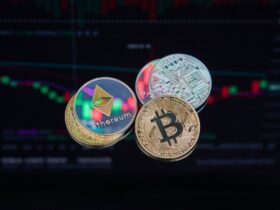Decentralised applications, also known as dApps, are applications that function on a peer-to-peer basis and do not make use of a central server but rather run independently. People are able to contact with one another immediately, which offers up a lot of opportunities. Here are the top five reasons why you should develop decentralised applications, so let’s have a look at them.
Owning Your Data
The problem with centralised data:
The modern web has become completely centralised. Multiple apps own all of our data, including text messages, images, and videos. Take WhatsApp, for example. Facebook bought WhatsApp for $22 billion when the company had only 35 engineers. Facebook didn’t buy the engineers, it bought the data of 500 million users, which it then capitalised on. The users, on the other hand, did not get any share of the profits.
Solution in decentralised applications:
In decentralised applications, users retain control over their data. People can pay each other for data instead of one group getting all the profits. Data becomes the most valuable asset in the new data economy. When robots start replacing half of all current jobs, your unique perspective and perception of the world will remain in demand.
You will be paid for your data, because in decentralised applications, you own it. Cryptocurrency can be used to pay for data or to store other people’s data. This will create a new economy where everyone can make money online.
Increased Data Reliability
Challenges of centralised storage:
In centralised applications, all data is stored on a central server. If this server goes down, the data can be lost forever. For example, if Dropbox is hacked, your important photos could disappear. Such a system is unstable.
Advantages of decentralised solutions:
There is no single point of failure in decentralised applications. Users can safely store their data on their own or distribute copies to multiple clients. This moves us towards a “persistent web” where links never die or 404 errors appear.
Faster Data Transfer
The limitations of centralised systems:
Soon we will be transferring huge files over the internet, up to petabytes in size. In centralised applications, data is retrieved from one central server, which can be time-consuming, especially if the server is far away.
Speeding up with decentralisation:
In decentralised applications, your computer will look for the nearest copy of the data you need. If multiple people have copies, your computer will request data from everyone at the same time, which will speed up downloading. Videos and games will load much faster.
Inability To Disconnect
Vulnerabilities of centralised networks:
Centralisation allows governments to block access to websites. China has blocked Facebook for its citizens, which is 20% of the world’s population. Recently, the Egyptian government shut down the internet to stop protests. If a data centre or ISP fails, users are left without access to data.
Vulnerability of decentralised applications:
A decentralised application cannot be shut down. Even if the government shuts down the internet, people can still communicate with each other on localised networks.
New Opportunities For Developers
The beginning of a new era:
Technologies like BitTorrent and Bitcoin are just beginning to unlock their potential. The first developers of successful decentralised applications will be remembered for years to come and will make a huge contribution to the development of technology.
Opportunities for innovators:
Those who are the first to create successful decentralised applications will break new ground and create value for the world.

Conclusion
Decentralised applications open new horizons in data security, speed and reliability. Ownership of their data, fast transmission and invulnerability to blockchains make them attractive to users and developers. These applications have the potential to create a new economy where everyone can make money from their participation in the network. The prospects for decentralised technologies are enormous and their development promises significant changes in our digital future.
FAQ
What technologies are used to create decentralised applications?
Decentralised applications often use blockchain technologies, cryptocurrency and peer-to-peer protocols such as IPFS and BitTorrent.
What are some examples of decentralised applications?
Examples include BitTorrent for file sharing, Bitcoin and Ethereum for cryptocurrency transactions, and IPFS for distributed data storage.
How do decentralised applications protect my data?
Decentralised applications use encryption and distributed storage to protect data from hacking and loss.
Can I make money with decentralised apps?
Yes, users can earn cryptocurrency for providing data, storing it, or performing various tasks on the network.
Is it difficult to develop a decentralised app?
Development requires knowledge of blockchain and cryptography, but as technology advances and new tools become available, the process becomes easier.
What are the disadvantages of decentralised applications?
The main disadvantages include complexity of development, possible performance issues and limited support from existing infrastructures.









